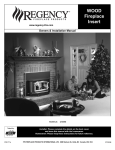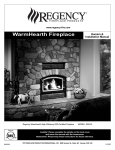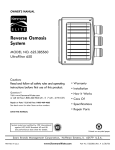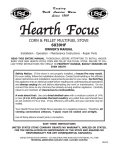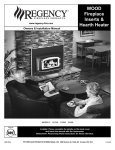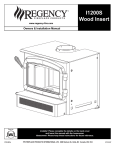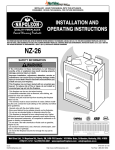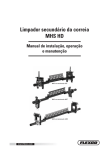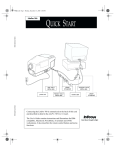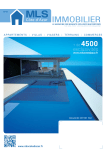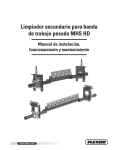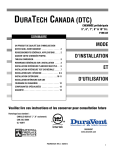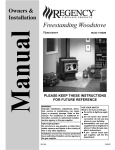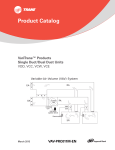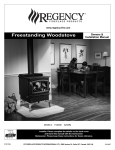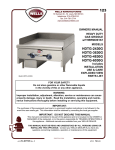Download Regency FP90 User's Manual
Transcript
www.regency-fire.com FP90 Wood Fireplace Owners & Installation Manual Regency High Efficiency EPA Certified Fireplace MODEL: FP90 Tested by: Installer: Please complete the details on the back cover and leave this manual with the homeowner. Homeowner: Please keep these instructions for future reference. FPI FIREPLACE PRODUCTS INTERNATIONAL LTD. 6988 Venture St., Delta, BC Canada, V4G 1H4 918-426j 04/04/08 Thank-you for purchasing a REGENCY FIREPLACE PRODUCT. The pride of workmanship that goes into each of our products will give you years of trouble-free enjoyment. This product has been certified by the Environmental Protection Agency of the United States. This means that it meets the strictest standards in providing you with the latest in clean burning technology and efficiency. Specifications may vary widely. Consult with your FPI Dealer for local considerations. Keep those REGENCY FIRES burning. 2 FPI FP90 Wood Fireplace TABLE OF CONTENTS SAFETY LABEL Safety Label For FP90 ..................................................4 INSTALLATION Product Details ..............................................................5 Read Before You Install .................................................6 Dimensions And Specifications .....................................7 Clearances and Height Requirements ..........................8 Installation Of Nailing Strips ..........................................9 Fireplace Enclosure Framing ........................................9 Framing Details ...........................................................10 Location Of Fireplace ..................................................10 Hearth Extension .........................................................10 How To Determine If Alternate Floor Protection Materials Are Acceptable .....................................10 Before You Start ........................................................ 11 Installation Components ...................................... 11 Chimney System Considerations ................................ 11 Chimney Height ................................................... 11 Chase Enclosure ................................................. 11 Installation Measurements / Framing Details ..............12 Installing The Stand-offs ..............................................13 Set The Regency FP90 Into Position ..........................13 Installing The Chimney System ...................................13 Assembly Steps ...........................................................13 Offset Chimney Installation ..................................14 Installing The Outside Air Kit .......................................15 Wiring The FP90..........................................................16 Installing The Blower Systems ....................................16 Internal Blower with Thermo-Disc ........................16 Gravity Air Feed Kit Option ..........................................16 Finishing The Regency FP90 ......................................17 Completing The Facing........................................17 Non-self Supporting, Thin Veneer Facades Installation............................................................17 Masonry Retainer Kit Option................................18 Finishing Details ..................................................19 Completing The Mantle........................................19 Masonry Liner / Bricks .................................................20 Secondary Air Tube Installation ..................................20 Glass Installation .........................................................20 Ash Drawer Kit Option ................................................21 Safety Precautions...............................................21 Ash Drawer Kit Installation...................................21 Ash Drawer Operating Guideline .........................21 FPI FP90 Wood Fireplace Fan Installation ............................................................22 Masonry Cover Plate Installation .................................23 Finishing Trim Kit Iinstallation ......................................25 Fireplace Screen Installation .......................................27 Regency Louver Installation ........................................28 Excalibur Faceplate Installation ...................................29 Excalibur Accent Kit Installation ..................................30 HEATWAVE KIT (NOT EPA APPROVED) Listings And Code Approvals .......................................31 General Information .....................................................31 Important Installation Notes .................................31 Parts ............................................................................31 Minimum Framing Clearances ....................................32 B) All Models: ......................................................32 Installation ...................................................................32 A) R90 / EX90 Models: .......................................32 Wiring Diagram ............................................................33 Operation .....................................................................33 Maintenance ................................................................33 Operating Instructions .................................................34 Draft Control ........................................................34 OPERATING INSTRUCTIONS First Fire ......................................................................34 Safety Guidelines ........................................................34 MAINTENANCE Plated Finishes ............................................................35 Door Gasket ................................................................35 Door Hinges ...............................................................35 Glass Cleaning ............................................................35 Glass Removal / Replacement ....................................35 Chimney Cleaning .......................................................35 PARTS LIST Parts List- Firebox & Body ...........................................36 Parts List- Baffles, Door, Options ................................37 WARRANTY Warranty ......................................................................39 3 SAFETY LABEL SAFETY LABEL This is a copy of the label that accompanies each Regency Fireplace. It is located inside the lower louver opening on the left side. We have printed a copy of the contents here for your review. NOTE: Regency units are constantly being improved. Check the label on the unit and if there is a difference, the label on the unit is the correct one. SAFETY LABEL FOR FP90 4 FPI FP90 Wood Fireplace INSTALLATION PRODUCT DETAILS EPA Certified : 3.72 g/hr Efficiency (EPA) : 63% BTU/HR (EPA) : 11,720 (Lo) to 42,400 (Hi) Flue Size : 8" (203mm) Diameter Log Size : 20" (508mm) Shipping Weight : 612 lbs (278kg) Stripped Weight : 570 lbs (259kg) INSTALLATION Emissions Options Ashdrawer R90/EX90 Fan R90/EX90 Surround Black EX90 Surround Polished Gold EX90 Surround Antique Nickel EX90 Louver Flush Black R90 Louver Flush Black/Gold R90 Louver Flush Black/Steel R90 Surround Accent Gold Excalibur EX90 Surround Accent Brush Nickel Excalibur EX90 Wood Screen R90/EX90 Finishing Trim R90 Masonry Retainer Kit R90 Gravity Vent Kit R90 8" (203mm) - 7" (178mm) Adaptor R90/EX90 1" Unit Base Standoffs FPI FP90 Wood Fireplace 5 INSTALLATION READ BEFORE YOU INSTALL THE REGENCY HIGH EFFICIENCY EPA CERTIFIED FIREPLACE INSTALLATION This installation manual will enable you to make a safe, efficient and dependable installation of your fireplace and chimney system. Please read and understand these instructions before beginning your installation. Do not alter or modify the fireplace or its components under any circumstances. Any modification or alteration of the fireplace system, including but not limited to the fireplace, chimney components and accessories, may void the warranty, listing and approvals of this system and could result in an unsafe and potentially dangerous installation. PLEASE RETAIN THIS MANUAL FOR FUTURE REFERENCE. IMPORTANT: Please read and follow these rules for safety. 1) Before starting your fireplace installation, read these installation instructions carefully to be sure you understand them in their entirety. Failure to follow them could cause a fireplace malfunction resulting in serious injury and/or property damage. 2) Always check with your local building department, fire department and local authorities prior to installation to determine the need to obtain a permit. 3) This model fireplace must be installed with one of the chimney systems listed in the Chimney Section in this manual. These systems are intended for use as a residential type appliance. The chimney must always vent to the outside of the building. 4) WARNING: THIS FIREPLACE HAS NOT BEEN TESTED WITH AN UNVENTED GAS LOG SET. TO REDUCE RISK OF FIRE OR INJURY, DO NOT INSTALL AN UNVENTED GAS LOG SET INTO THE FIREPLACE. 6) Use solid fuel only. DO NOT use artificial logs containing petroleum products, chemical chimney cleaners, gas logs, gas lighters, salt contaminated wood or flame colorants in your fireplace. When using compressed sawdust logs use only at 1/3 capacity since these get very hot and expand. 7) DO NOT use charcoal or coal under any circumstances. 8) NEVER use gasoline, gasoline-type lantern fuel, kerosene, charcoal lighter fluid, or any liquid to start or “freshen up” a fire in this fireplace. Keep any flammable liquid a safe distance from the fireplace. 9) Ashes should be placed in a metal container with a tight-fitting lid. The closed container of ashes should be placed on a non-combustible floor or on the ground, well away from all combustible materials, pending final disposal. If the ashes are disposed of by burial in soil or otherwise locally dispersed, they should be retained in the closed container until all cinders have thoroughly cooled. 10) WARNING: Only operate fireplace with doors fully open when optional fire screen is used. 11) NEVER leave children unattended when there is a fire burning in the fireplace. 14) FPI Fireplace Products International Ltd. does not warranty “smoke-free” operation nor are we responsible for inadequate system draft caused by mechanical systems, general construction conditions, inadequate chimney heights, adverse wind conditions and/or unusual environmental factors or conditions beyond our control. 15) IMPORTANT: Check with your local building department as to the requirements of sealing any penetrations to the exterior. This will ensure that the integrity of the building is intact. 16) DO NOT use a fireplace insert or any other product not specified by Regency for use with this fireplace. 17) NEVER, under any circumstances, install a fireplace, chimney component or any accessories, supplied by Regency, that have visible or suspected physical damage as a result of handling or transportation. These items should be inspected by a Regency dealer or qualified factory representative to ensure safe condition. When in doubt, consult your Regency dealer. 18) It is recommended that power is supplied to the terminal block of the unit to allow for the installation of blower components now or at a future date. 12) Allow the fireplace to cool before servicing. Always shut-off any electricity to the fireplace while working on it. This will prevent any possible electrical shock. 13) Regency is not responsible for any smoking or related problems that may result from the lack of adequate combustion air. It is the responsibility of the installer to ensure that adequate combustion air has been provided for the fireplace. Emissions from burning wood or gas could contain chemicals known to the State of California to cause cancer, birth defects or other reproductive harm. 5) To ensure a safe fireplace system and to prevent the build-up of soot and creosote, inspect and clean the fireplace and chimney prior to use and periodically during the heating season. 6 FPI FP90 Wood Fireplace INSTALLATION DIMENSIONS AND SPECIFICATIONS The Regency is a wood burning fireplace featuring a self-contained heat-circulating system and castiron doors with large viewing windows. A set of andirons are installed in the firebox to properly position the fire, do not remove them. The Regency fireplace has been tested and listed by OMNI Test Laboratories, Inc. to ULCS610 Standard for Canada installations. This unit is intended for installation in conventional homes and buildings of conventional construction, not in mobile homes. FAILURE TO USE PARTS MANUFACTURED BYFPIFIREPLACE PRODUCTS INTERNATIONAL, LTD., OR VARIATIONS IN TECHNIQUES AND CONSTRUCTION MATERIAL DESCRIBED IN THIS MANUAL, MAY CREATE A FIRE HAZARD AND VOID REGENCY’S WARRANTY. 14- 5/8" (371mm) The FP90 main unit consists of the following: 1) 2) 3) 4) 5) 6) 7) The main fire box and heat exchanger Double doors with ceramic glass Vermiculite side panels and baffle The insulated outside air duct Hearth Safety Strip 1" unit base stand-offs Nailing Strips INSTALLATION Note: Illustrations shown reflect “typical” installations with nominal dimensions and are for design and framing reference only. Actual installations may vary due to individual design preferences. However, always maintain minimum clearances to combustible materials and do not violate any specific installation requirements. This fireplace system is designed for installation in accordance with the National Fire Protection Standard for chimneys, fireplaces and solid fuel burning appliances; NFPA 211 and in accordance with codes such as the BOCA Basic National Codes, the Standard Mechanical Code, Uniform Building Codes or applicable local codes. 13-3/8" (371mm) 50- 1/2" (1283mm) 42- 5/8" (1083mm) 37-3/8" (949mm) 31" (787mm) 29-1/8" (740mm) 3-5/8" (92mm) 38" (965mm) 43- 5/8" (1108mm) Unit Dimensions FPI FP90 Wood Fireplace 1-3/8" (35mm) 7-7/8" (200mm) 4-3/4" (121mm) 9-5/8" (244mm) 15" (381mm) 25" (635mm) 28" (711mm) 7 INSTALLATION CLEARANCES AND HEIGHT REQUIREMENTS INSTALLATION The FP90 may be placed on or near construction materials. The combustion air kit, fire stop spacer and roof flashings (not chase flashings) may be placed directly on or against normal construction materials. The chimney requires a minimum 2" (51mm) clearance. A combustible mantle (to a depth of 10", 254mm) may be installed no closer than 18" (457mm) above the warm air vent or 55-1/2" (1410mm) from bottom of unit. No Combustibles on Face of Unit. Combustibles May Not Extend to Unit Face. Do not notch wallboard around standoffs. WARNING: Do not pack or fill required air spaces with insulation or other material. No material of any kind is allowed in these areas. NOTES: 1) Do not insulate the chase cavity with blown or fill type insulation materials. 2) Local codes may not require firestopping at the ceiling level for outside chase installations; however, it is recommended for safety and the reduction of heat loss. The chimney must be enclosed when installed in or passing through a living area where combustible material or people may come in contact with it. This is important to prevent possible personal injury or fire hazard. 3) We recommend that you insulate at least the first floor of the chase to prevent heat loss. For any further information, please call your dealer. Special restrictions apply to the front and facing of the fireplace and nearby walls. 4) Some local codes require 1 hour fire rating on one or all sides of fire chases. Check with your local authorities. WARNING: If insulation is used, do not place the unit against it. Insulation or vapor barriers, if used, must be secured to assure insulation and vapor barriers remain in place and do not affect the required air spaces. Max. 10" (254mm) Depth of Mantel center line 18" (457mm) 55-1/2" (1410mm) from bottom of unit 20" (508mm) 18" (457mm) 40" (1016mm) Clearances to Combustibles 8 FPI FP90 Wood Fireplace INSTALLATION INSTALLATION OF NAILING STRIPS FIREPLACE ENCLOSURE FRAMING 1) Assemble 3 Nailing Strip Spacer Plates to the left and the right Nailing Strips as shown below. As per the diagram, the framing of the main enclosure should not infringe on the area above the fireplace to the ceiling level. The rear and side walls as well as the face above the fireplace must not extend into the area above the unit. The only structure allowed above the unit is on the stand-offs at the front of the unit supporting the header. Left Nailing Strip Nailing Spacer The enclosure walls can be framed using any suitable material (2x4 - 2x6 studs, plywood, gyproc, etc.), Normally, framing will be set back to allow Non-Combustible Material to be flush with the front of the fireplace. x 12 2) Mount Nailing Strips left, right and top to the positions indicated below. Right Nailing Strip Top Nailing Strip 44" (1118mm) CAUTION: O N LY NONC O M B U S T I B L E M AT E R I A L LIKE EXPANDED METAL OR CONCRETE BOARDS SUCH AS WONDERBOARD AND DUROCK, ETC. MAY BE USED IN THE SPACE BETWEEN THE UNIT AND THE FRAMING IN FRONT OF THE UNIT ONLY. Note: If the fireplace is being cantilevered through an outside wall, the entire enclosure (floor, wall and false ceiling) up to the first ceiling level must be completely insulated and vapor sealed and sheathed, to avoid transfer of cold air through the fireplace when not in use. 50-3/4" (1289mm) Framing Specifications 31 41 " [795mm] Left Nailing Strip 8121 " [2072mm] 934 " [248mm] 5758 " [1465mm] x9 NOTE: Nailing Strips are adjustable to allow for correct offset from the front of the fireplace for your current application. 115 38 " [2930mm] 60 " [1524mm] CHASE There are two adjustments to allow for maximum offset (1" , 25mm recessed from front of fireplace or 1.25", 32mm extending past front of fireplace). The Nailing Strip Spacers can be adjusted by loosening the two screws securing them to the Nailing Strips. The Nailing Strips can also be moved forward and back by adjusting the screws that mount them to the fireplace. 1334 " [348mm] 1334 " [348mm] 1458 " [370mm] 28 " [710mm] 44 " [1118mm] 18 " [457mm] Building Structures Cannot Encroach on Chase FPI FP90 Wood Fireplace 9 INSTALLATION Right Nailing Strip There is framing only on the front of the unit. When framing in the header (directly above the fireplace) DO NOT bring any combustible material lower than the top of the stand-offs. Framing header may be positioned on end directly on top of the front fireplace stand-offs. Be sure to seal the space between the fireplace and the enclosure above and on either side of the unit with Wonderboard, Durock or other similar non-combustible sheeting to prevent hot air from entering the enclosure. INSTALLATION FRAMING DETAILS Fire Stop Note: The “Z” type safety strip is not supplied by Regency and must be fabricated locally. 2 x 6 Stud Wall with a 2 x 4 Header Straightrun for 8"(203mm) Hot Air Duct FINISHING MATERIAL FireStop 10" (254mm) NON-COMBUSTIBLE 5"(127mm) wide sheet metal strip under unit and hearth 84" 50-3/4" (1289mm) INSTALLATION Unit projects out flush with non-combustible material 2 x 4 Framing LOCATION OF FIREPLACE 1) Carefully select the proper location for heat circulation, aesthetics, chimney obstructions and clearance to side wall(s). With proper pre-planning, a slight adjustment of a few inches can save considerable time and expense later during construction and assembly. 2) Carefully consider the position of the fireplace opening with respect to the location of adjacent or nearby stairwells, bath or kitchen exhaust fans and/or return air registers for forced air furnaces/air conditioners that could cause a smoking fireplace condition if the house is tightly insulated. 55-3/4" (2137mm) (1416mm) 42-5/8" (1083mm) 1/2"(13mm) THICK HEARTH EXTENTION 2x4 Stud Wall (64mm) (64mm) Diagram 1 2 x 6 Framing The specified floor protector should be 1/2” (13mm) thick material with a k-factor of 20.07. HEARTH EXTENSION NOTE: Hearth must have 1/2" (13mm) Millboard under finish material with minimum "k" factor of 20.07. When unit is raised 4" (102mm), the thermal floor protection is not required. If you plan to raise the fireplace and hearth extension, build the platform assembly then position fireplace and hearth extension on top. If you are not raising the unit, check that you will have sufficient clearance under the bottom louver for your finishing material on top of the hearth extension, i.e. tiles, concrete board, etc. 1) Insert the metal safety strip, packaged with the fireplace beneath the fireplace as illustrated in Diagram 1 below. The safety strip should be tacked down to prevent possible shifting and should overlap for continual coverage of the floor. Note: A safety strip is not required when the fireplace rests on a non-combustible surface. Note: Install the hearth extension only as illustrated. 3) Fireplace must be anchored to the framing to prevent movement or rocking; use the nailing strips which have been supplied. The nailing strips are installed to the side of the unit and to the front side of the 2 x 4 or 2 x 6. 10 How To Determine If Alternate Floor Protection Materials Are Acceptable The safety strip should extend 2 in. (51 mm) in front and on the sides of the fireplace. In the event a wooden support is used to elevate the fireplace above the floor, a “Z” type safety strip should be fabricated from 20 gauge galvanized sheet steel and used to protect the front surface of the wood support as well as the floor beneath the hearth extension. The proposed alternative is 4” (102mm) brick with a C-factor of 1.25 over 1/8” (3mm) mineral board with a k-factor of 0.29. Step (a): Use formula above to convert specification to R-value. R = 1/k x T = 1/0.84 x .75 = 0.893. Step (b): Calculate R of proposed system. 4” brick of C = 1.25, therefore Rbrick = 1/C = 1/1.25 = 0.80 1/8” mineral board of k = 0.29, therefore Rmin.bd. = 1/0.29 x 0.125 = 0.431 Total R = Rbrick + Rmineral board = 0.8 + 0.431 = 1.231. Step (c): Compare proposed system R of 1.231 to specified R of 0.893. Since proposed system R is greater than required, the system is acceptable. DEFINITIONS Thermal Conductance: C = Btu = W (hr)(ft2)(oF) (m2))(k) Thermal Conductivity: k =(Btu)(inch) = W = Btu (hr)(ft3)(oF) (m)(k) (hr)(ft)(oF) Thermal Resistance: R = (ft2)(hr)(oF) Btu = (m2)(k) W FPI FP90 Wood Fireplace INSTALLATION CHIMNEY SYSTEM CONSIDERATIONS Regency’s FP90 Fireplace is to be installed with one of the following Chimney Systems only. Chimney systems only 7" (178mm) or 8" (203mm) diameter are to be used. In Canada Any of the following ULCS 629 listed chimney systems may be used: A chase is a vertical box-like structure constructed to surround the fireplace and chimney. A ventilated chase cap is highly recommended. Refer to flue manufacturer's instructions for reduced flue heights above chase terminations. As with all chimney installations, avoid overhead obstructions such as trees, power lines, etc. Note: Insulation does not come in contact with Chimney. Maintain a 2" (51mm) clearance. A chase should be constructed just like any outside wall, insulated and vapor barriered. Please check with local building authorities. In a cold climate, we recommend the base of the chase be insulated between the solid continuous floor beneath the fireplace and the chase bottom. If used, the value and amount of chase insulation in a cold climate installation is optional and not required for safety. Insulation is recommended to avoid heat loss. Note: 8" (203mm) - 7" (178mm) adapter is mandatory for installation using 7" (178mm) chimney. Anchor plate must be purchased with selected chimney system from Chimney Supplier. INSTALLATION 1) CF Sentinal 2) SuperPro 2100+ 3) SuperVent 2100+ 4) Security S-2100+ 5) Oliver Macleod HT6000+ 6) Dura Plus HTC 7) ICC Excel 2100 Chase Enclosure BEFORE YOU START The use of only one of these systems is permitted when installing the fireplace. Do not alter or mix parts from other systems as this may cause a potential hazard and void Regency’s limited warranty. Check your inventory list to be sure you have all the necessary parts supplied in good usable condition. Check for any concealed damage. Check the operation of the combustion air damper. When the damper is in the fully closed position, the damper handle should be to the left. When damper is in the fully open position, the damper handle must be in the right position. Chimney Height INSTALLATION COMPONENTS DIAGRAM Installation Components Rain Cap The total height of your chimney system from the top of the fireplace to the chimney cap must not exceed 40'(12m), and must also meet minimum system height requirements. Please refer to the flue manufacturer's instructions for specific details. Refer to Minimum Recommended Flue Height section. Storm Collar Roof Flashing Attic Radiation Shield Framing Ventilated Chase Pan Nailing Strip Ins ide ll Wa Outside Fresh Air Duct Hearth Extension Outside Air Inlet FPI FP90 Wood Fireplace Hearth Safety Strip 11 INSTALLATION INSTALLATION MEASUREMENTS / FRAMING DETAILS 60" (1524mm) WIDE INSIDE MIN. UNIT TO BE CENTERE D 30" (762mm) 3" (76mm) STAND-OFF 2x4 FRAMING FRONT OF UNIT ONLY INSTALLATION COMBUSTION AIR TO OUTSIDE 19" (483mm) 11" (279mm) 38" NOTE: (965mm) FRAMING TO BE AGAI NST STAND-OFFS ONLY 10" (254mm) 60"(1524mm) WIDE INSIDE CHASE MIN. 2X 4, 24" (610mm) 50 3/4" (1289mm) 2X 6, 2X 8O N EN 11" (280mm) 2x4 D VENT TO OUTSIDE COMBUSTION AIR 2x4 18" (457mm) 46"(1168mm) MIN. 84" (2134mm) CEILING HEARTH MUST HAVE 1/2" (127mm) MILLBOARD UNDER FINISH MATERIAL WITH MIN. "K" FACTOR OF 20.07 40" (1016mm) 11" (280mm) 44" (1118mm) 18" (457mm) NOTES: 1) CHASE MUST BE 60" (1524mm) WIDE INSIDE AND UNIT TO BE CENTERED IN OPENING. 2) MANTEL MIN. HEIGHT OF 18" (457mm) FROM TOP OF LOUVER OPENING TO UNDERNEATH MANTEL or 55 1/2" (1410mm) FROM BOTTOM OF UNIT. 3) MUST HAVE NON-COMBUSTIBLE MATERIAL EXTENDING 11" (280mm) ON EITHER SIDE AND 9" (229mm) ON TOP. 3/8" (10mm) THICK FINISHING MATERIAL TO BE INSTALLED ON TOP OF THIS. 4) FRAMING IS SLIGHTLY LARGER THAN UNIT DIMENSIONS TO ALLOW FOR EASIER INSTALLATION (50 3/4", 1289mm H x 44", 1118mm W) 5) MUST MAINTAIN A MIN. OF 46" (1168mm) FROM TOP OF LOUVER OPENING TO FINISHED CEILING. 6) MUST MAINTAIN A MIN. OF 24" (610mm) TO SIDE WALL FROM THE EDGE OF THE TOP LOUVER OPENING. 7) HEARTH MUST BE A MIN. OF 40" (1016mm) WIDE x 18" (457mm) deep and 1/2" (127MM) THICK. 12 FPI FP90 Wood Fireplace INSTALLATION ASSEMBLY STEPS Note: The following steps represent the normal sequence of installation. Each installation is unique, however, and might require different steps. Each step is dealt with in detail in the following pages. 2) Complete framing and installation of nailing strips for the FP90. I M P O R TA N T: Remove gold accessories such as louvers while installing to avoid marking. IMPORTANT: It is absolutely necessary to attach stand-offs to the unit to avoid combustion problems. Serious overheating of combustible framing and possible fire may result if stand-offs are not properly installed. IMPORTANT: Under no circumstances can the fireplace top or side spacers be removed or modified. Do not notch the header to be installed closer than the fireplace outside facing spacers. The fireplace may be installed directly on a combustible floor or raised on a platform of an appropriate height. Do not place fireplace on carpeting, vinyl or other soft floor coverings. It may, however, be placed on flat wood, plywood, particle board or other hard surfaces. Be sure the fireplace rests on a solid continuous floor or platform for support and to prevent cold air from entering the room from under the fireplace, if against an outside wall. The fireplace may be positioned and then the framing built around it, or the framing may be constructed and the fireplace positioned into the opening. The minimum ceiling height is 7ft (2m) from the base of the unit. A suitable non-combustible hearth pad is mandatory in all installations. See Framing Details. INSTALLING THE CHIMNEY SYSTEM Position firebox prior to framing or into prepared framing. 3) Install the Chimney System. Following are a set of general guidelines for installation of the chimney system. The more detailed installation manual supplied with the specific chimney system must be followed. 4) Install Outside Combustion Air Kit . 5) Hook-up the Wiring. 6) Install the Blower. 7) Gravity Air Feed Option. 8) Complete finish wall material, surround and hearth extension to your individual taste. 9) Position vermiculite liner/bricks and ceramic fiber insulation in the unit. Attach louvers, glass, doors, handles. INSTALLING THE STAND-OFFS Stand-offs are installed to provide reduced temperatures and proper clearances for the safe installation of your product. They consist of four 3" (76mm) stand-offs on the back, two 3" (76mm) stand-offs on each side and one 8" (203mm) stand-off on the top of the unit. Attach these stand-offs where indicated in the pre-drilled holes on the unit body. IMPORTANT: Insulation extends forward to seal against the back of the fireplace masonry or non-combustible face. SET THE REGENCY FP90 INTO POSITION 1) Estimate the total weight of the fireplace system and surround materials such as brick, stone, etc., to be installed. Shipping weight is 612 lbs (278kg). 2) Measure the square footage of the floor space to be occupied by the system, surrounds and hearth extensions. 3) Note the floor construction, i.e. 2 x 10’s, (51 x 250 mm), single or double joists, type and thickness of floor boards and consult your local building code to determine if you need additional support. 4) Remove door, firebox bricks, louvers etc. Note: Set aside Gold louvers away from harsh chemicals and away from abrasive materials to avoid damage, e.g. muriatic acid for masonry wash will strip the gold plate. Firebricks are fragile and should be handled with caution. FPI FP90 Wood Fireplace 1) Using standard construction framing techniques, construct the opening for the chimney route up through the ceiling(s) and roof or through an outside chase. Framing must maintain adequate minimum air space clearance at all times. CAUTION: Allow a minimum 2" (51mm) chimney air space or as specified by the owner's manual for the chimney, to combustible framing members throughout vertical or offset chimney installation. 2) Attach fireplace adaptor/anchor plate to the top of the fireplace. It is important that a tight seal be made with this part and the unit’s collar. This must be purchased with the fireplace. 3) Install firestop, radiation shield, or attic insulation shield as required at each floor penetration. See Table 1 (page 15). Check chimney manufacturer's framing opening sizes to allow for correct clearances. All parts must be listed. 4) The roof flashing should be installed making sure that alignment is correct with openings below. 5) Chimney lengths may now be added until the required height is reached. A minimum flue height of 12ft. (4m) from the top of the unit is mandatory. Please refer to Table 2 for Flue Heights (page 15). 13 INSTALLATION 1) Install stand-offs and insulation strip to the unit. See Installing the Stand-offs section on this page. There is also 1" unit base standoffs that are supplied with the unit. These are optional and are to be used to raise the unit. The thickness of the finished hearth will dictate the height of the stove. Please be careful to ensure that the bottom louver will open when unit is installed with the finished hearth. INSTALLATION INSTALLATION The performance of your unit is governed to a very large extent by the chimney system. Too short a chimney can produce poor drafting which in turn can cause difficult start-up, dirty glass, smoking out door and even reduced heat output. Too tall a chimney may prompt excessive draft which can result in very short burn times and excessive heat output. The chimney must extend at least 3ft. (0.9m) above its point of penetration of the roof. It must also be at least 2ft. (0.6m) higher than any point of a roof, wall, or building within 10ft. (3m) of it. 6) The raincap and storm collar should now be fastened to the top of the chimney. Install additional support(s) as indicated by chimney manufacturer's instructions. SPECIAL NOTES: Offset Chimney Installation 1) Negative Pressure In The House. When there is no fire in your unit there still should be sufficient draft to draw smoke from a burning piece of paper held under the baffle. If your installation is correct, smoke will go up the flue. If however, there is a problem with your installation, cold air may be coming down the flue into the room. Chimney elbows may be used in the installation of the system. A maximum of four 30 degree elbows are allowed. Offset angles of 30 and 15 degrees are allowed with a maximum of 2 offsets. 1) Install the fireplace and chimney as described above. When you require an elbow, proceed as follows: This may be the case if your unit smokes on start-up with the door open, until the unit heats up. To overcome this problem, try closing an upstairs window and open a nearby window to pressurize the house. 2) Install the elbow. Turn the elbow to the required direction and fasten it with screws or locking bands depending on flue design as specified by the manufacturer. Note: the door can be open briefly to start your fire but must be closed during regular operation because the unit uses outside air for combustion, not room air. 3) Turn the chimney lengths clockwise to lock them together, then secure them with screws at each joint or locking bands; see the manufacturers requirements. 2) Multiple Terminations. When you install more than one chimney in the same chase or within the same general area, we suggest that their terminations be separated by at least 16" (410mm) horizontally and 18" (460mm) vertically. This separation is to prevent smoke migrating from one chimney to another. 4) Use another elbow to return the chimney to vertical. 3) Chimney Maintenance. It is important that you inspect your chimney regularly and keep it clean. If you note more than 1/8" (3mm) creosote build up in your chimney have it cleaned as per instructions of the chimney manufacturer. 4) Chimney Fires. If you do have a chimney fire, refer to the following: 5) Install an offset support in the joist at the ceiling. Re-support above each offset; elbows are not designed to carry the weight of the flue system. Roof Flashing Attic Insulation Shield a. Close the fireplace doors and air damper. Use Listed Roof, Offset, or Floor Support Use Listed Roof, Offset, or Floor Support b. Clear family members out of the area. c. Call the fire department. d. Use a dry chemical fire extinguisher, baking soda or sand to control the fire. Do not use water, it will create a steam explosion. Joist Radiation Shield 45 Elbow e. Check for hot embers around the unit and outside your home; extinguish. f. 14 Do not use your fireplace again until it has been inspected by a qualified person. FPI FP90 Wood Fireplace INSTALLATION TABLE 1 Required Firestop, Radiation Shield, Or Attic Insulation Shield Model 1st Floor 2nd Floor into Attic CF Sentinal Intermediate Joist Shield Attic Insulation Shield Super Pro 2100+ Attic Insulation Shield Attic Insulation Shield Attic Insulation Shield Attic Insulation Shield Security S2100+ Radiation Shield Fire Stop Insulation Radiation Shield Attic Radiation Shield Oliver Macleod Project HT6000+ Radiation Shield Fire Stop Insulated Attic Radiation Shield Simpson DuraPlus HTC Fire Stop Radiation Shield Attic Insulation Shield ICC Excel 2100 Radiation Shield Radiation Shield with Storm Collar INSTALLATION Super Vent 2100+ TABLE 2 Minimum Recommended Flue Height In Feet (Measured from the top of the solid fuel appliance) ELEVATION (FT) ABOVE SEA LEVEL # OF ELBOWS 0 2 x 15o 4 x 15o 2 x 30o 4 x 30o 2 x 45o 4 x 45o 0ft - 1000ft (0m - 305m) 12.00ft (3.66m) 13.00ft (3.96m) 14.00ft (4.27m) 15.0ft (4.57m) 18.00ft (5.49m) 16.00ft (4.88m) 20.0ft (6.10m) 1000ft - 2000ft (305m - 610m) 12.48ft (3.80m) 13.52ft (4.12m) 14.56ft (4.44m) 15.6ft (4.75m) 18.72ft (5.71m) 16.64ft (5.07m) 20.0ft (6.10m) 2000ft - 3000ft (610m - 914m) 12.96ft (3.95m) 14.04ft (4.28m) 15.12ft (4.61m) 16.2ft (4.94m) 19.44ft (5.93m) 17.28ft (5.27m) 21.6ft (6.58m) 3000ft - 4000ft (914m - 1219m) 13.44ft (4.10m) 14.56ft (4.44m) 15.68ft (4.78m) 16.8ft (5.12m) 20.16ft (6.14m) 17.92ft (5.46m) 22.4ft (6.83m) 4000ft - 5000ft (1219m - 1524m) 13.92ft (4.24m) 15.08ft (4.60m) 16.24ft (4.95m) 17.4ft (5.30m) 20.88ft (6.36m) 18.56ft (5.66m) 23.2ft (7.07m) 5000ft - 6000ft (1524m - 1829m) 14.40ft (4.39m) 15.60ft (4.75m) 16.80ft (5.12m) 18.0ft (5.49m) 21.60ft (6.58m) 19.20ft (5.85m) 24.0ft (7.32m) 6000ft - 7000ft (1829m - 2134m) 14.88ft (4.54m) 16.12ft (4.91m) 17.36ft (5.29m) 18.6ft (5.67m) 22.32ft (6.80m) 19.84ft (6.05m) 24.8ft (7.56m) 7000ft - 8000ft (2134m - 2438m) 15.36ft (4.68m) 16.64ft (5.07m) 17.92ft (5.46m) 19.2ft (5.85m) 23.04ft (7.02m) 20.48ft (6.24m) 25.6ft (7.80m) 8000ft - 9000ft (2438m - 2743m) 15.84ft (4.83m) 17.16ft (5.23m) 18.48ft (5.63m) 19.8ft (6.04m) 23.76ft (7.24m) 21.12ft (6.44m) 26.4ft (8.05m) 9000ft - 10000ft (2743m - 3048m) 16.32ft (4.97m) 17.68ft (5.39m) 19.04ft (5.80m) 20.4ft (6.22m) 24.48ft (7.46m) 21.76ft (6.63m) 27.2ft (8.29m) INSTALLING THE OUTSIDE AIR KIT Combustion air is fed to the firebox through a connection on the rear lower left side of the unit. A free flowing supply of air must be available to this opening at all times. Combustion air may be taken from inside the building if the local building code allows, but performance may suffer. Also, it must go through the 6" (152mm) duct to the connection on the left hand side. Air drawn from the interior of the building will affect the performance of gas or oil furnaces, and exhaust fans and fan driven appliances. This may cause a negative pressure in the house allowing smoke to back into the home. FPI FP90 Wood Fireplace The preferred source of combustion air is from outside the building. If possible, install the kit on the wind loading side of the building not the leeward or (negative pressure) side. Note: Do not obtain combustion air from attic, garage or other enclosed space. 3) Cut a 7" (178mm) hole through the wall and mount the outside air kit. 4) Attach the two ends of the duct (making sure not to damage the insulating cover) after installing the flange on the fireplace side. Duct must be secured by screws or clamp. Side Connection Exterior Wall Unit 1) Put the supplied insulated air duct to a nearby exterior wall. Maximum length of duct is 20ft (6.1m). Duct length should be kept to a minimum and as straight as possible. Note: 4 ft. only is supplied with unit. Termination should be in an area with good air flow. Outside Metal Vent 2) Ensure that your air source is not close to automobile exhaust, gas meters or other vents. Outside Air Inlet must be 6 ft. (152mm) below the chimney termination point Insulated Metal 6” Duct 15 INSTALLATION WIRING THE FP90 Jakel AX-2495 Blower Plan View Field wire main power supply to fireplace blower system. (All electrical connections should only be performed by a licensed/certified electrician). Angle View INSTALLING THE BLOWER SYSTEMS Fan Transfer Plate Front View Right View The FP90 Fireplace has been designed to meet a wide range of heating requirements. The radiant heat (through the large glass area) combined with the naturally convected heat, allows the FP90 Fireplace to adequately heat an average sized room. A blower is recommended to assist in heating a larger area or one with wall separations. Through the use of two separate blower systems, Regency has developed the basic blower wiring options listed in the diagrams shown. Fan 910-175 AX-3088 910-903 910-516 Hot - to Variable Switch Ground Neutral - from Fan 910-811 INSTALLATION CAUTION: Label all wires prior to disconnection when servicing controls. Wiring errors can cause improper and dangerous operation. 919-885 Thermodisc 910-142 P60T12 Power Chord 910-619 Ground Variable Switch 910-330 Internal Blower with Thermo-Disc The thermodisc provides the user with more convenient control. The fan operates automatically - turn the knob to adjust to desired speed. The fan will turn on as the stove comes up to operating temperature. After the fire cools to below a useful heat output range the fan will shut off automatically. Place sticker on outside of bottom louver. GRAVITY AIR FEED KIT OPTION The Gravity Air Feed Kit is designed to extend the heat output vent above the FP90 to the front or the side. The upper louver opening is blocked off and flex vent is connected to the vent holes in the top of the unit and run to discharge vent grilles. Both 8" (203mm) diameter insulated Flex vents must be used along with one 30 sq. inch (194cm2) chase vent grill to bring additional air into the chase (for U.S. installations only). 6" (152mm) Min. To Rouch Opening Ceiling Flue Center-line of Vent Flex Vent Connector Collar Insulation Strips Qty Description 4 4 2 Connector Collars Adjustable Clamps 5’ lengths of flexible vent pipe (8” dia.) Insulated Sleeves Block Off Plate Discharge Vent Mounting Frames 1/4-20 x 1/2” Truss Head Screws (used for EX90/R90 only) 16 x 8 Discharge Vent Grilles #8 Drywall Anchors Insulation Strips Chase Vent Frame (not required for FP90) 8 x 8 Chase Vent Grille (not required for FP90) 2 1 2 7 2 4 4 1 1 16 Vent Cover 'A" Clamp Connector Collar Discharge Vent Grill Vent Cover 'B' (Inside) Base of Stove Outside Air Intake Block-off Plate (replace top louver) Chase Vent Grill Alternate Position for Chase Vent Grill 30 sq.in. (194 sq.cm) opening FPI FP90 Wood Fireplace INSTALLATION 1) Remove the screw from the vent hole cover (vent cover 'A') on top of the unit. 2) Take the connector collar and press and rotate it into the hole to cut through the insulation layer. Remove the collar and remove insulation from the collar. The screws for the inner cover should be exposed. 3) Remove the screws from the inner cover (vent cover 'B') and slide it back under the insulation. 5) Use tin snips to cut slits into the rim of the connector collar. A minimum of four tabs will be required so cut the slits 1” (25mm) (i.e. 1” (25mm) wide tabs) apart around the perimeter of the collar. 6) Install the connecting collar into the top of the unit until the bead of the collar rests against the top of the inner top of the unit. Reach inside the upper louver opening and use pliers to bend the tabs (minimum 4) out on the connector collar. A hammer may be required to lightly tap the tabs and bend them so that they fit tightly against the bottom of the inner top. Pull the insulation sleeve down to the top of the unit. Repeat steps 1-6 for the second flex vent and collar assembly. 7) Position the vent frames for the Discharge Grilles into the rough opening of the stud wall framing. Make sure to add two insulation strips behind the flanges of the frame prior to securing to wall. The frames will fit between studs framed at 16” (406mm) on center. Use 4 nails or screws to mount the frame to the stud framing. Connecting Collar Flex Vent Discharge Vent Grille 10) Install the block-off plate to the unit. The block-off plate will cover the upper louver opening of the unit and force the fan air to circulate through the two 8” (203mm) diameter flex vents. Put high temperature sealant onto the block-off plate. Mount the block-off plate onto the front of the unit and cover the upper louver opening. Make sure that all exposed holes in the block-off plate are sealed with high temperature sealant. NOTE: Make sure the block-off plate is flush and fastened tightly to the Regency FP90 Fireplace. 11) The rough opening size for the Chase Vent Grille is 3” H x 10”W (76mm H x 254mm W). WARNING: A chase vent of 30 sq. inches (194 cm2) MUST be installed in all applications, otherwise serious overheating of the chase may result. Use the chase vent supplied with the FP90 unit only or any equivalent one with the same or less restriction of air flow (for U.S. installations only). Flex Vent Insulation Strips 9) Pull the insulation sleeve up the flex vent to the back of the mounting frame. The flex vent should now be connected to both the unit and the mounting frames securely. Repeat steps 1-8 for the second flex vent assembly. 12) Recheck all flex vent-work connections to make sure that they are secure. Install wall sheathing and cut-out openings for the chase ventilation, and hot air discharge outlets. 13) Install the Chase Vent Grille and install the Discharge Vent Grilles for the hot air outlets. NOTE: There must be a minimum of 5" (127mm) between the gravity air vents. FINISHING THE REGENCY FP90 Completing The Facing Facing materials must be thin veneer (non-self supporting facades) or self supporting facades. If you are installing a thin veneer facade the Regency Masonry Retainer Kit is recommended. All facades must be Non-Combustible such as brick, rock or ceramic tile. See Clearance to Combustible diagram at the beginning of this manual to determine the extent to which you must use non-combustible materials. Gypsum wallboard is not non-combustible. Non-self Supporting, Thin Veneer Facades Installation 1) Install heavy expanded metal only on the top half of the fireplace using a drill to predrill holes and install using tap screws at locations as indicated on kit. 2) Install metal edging of kit on each side of the doors making sure the edges fit nicely with the arch edge above. 3) Cover the rest of the area with wire mesh or metal lath, overlapping around the heavy expanded metal. Make sure nails or staples used for fastening mesh penetrate studs at least 1" (25mm). 4) Mortar must be "thin set" or "thin bed" type inherently polymer modified. If not modified, you should add a synthetic latex additive. Mix to a firm, moist consistency. Using a plasterer's or mason's trowel apply mortar 1/2" (13mm) to 3/4" (19mm) thick to prepared surface area. Do not spread more than a workable area so that the mortar will not set up before stone or brick is applied. Note: Remove the fireplace doors and louvers and store them in a safe place until all the masonry work is finished. Acid from the cleaning operation will permanently damage gold plating. 5) If additional mortar is required, use a grout bag to fill in joints. Care must be taken to avoid smearing on the surface of stone or brick. Accidental smears should be removed only after mortar has become crumbly, using a whisk broom or dry bristle brush. Do not use a wet brush or a wire brush. 6) When mortar joints have become firm (thumb-print dry) they should be pointed up with a wood stick or metal jointing tool. Clamp Discharge Vent Frame FPI FP90 Wood Fireplace 17 INSTALLATION 4) Extend flex vent and pull the insulation sleeves over the 8” (203mm) diameter flex vents. Leave a short section of flex vent exposed at each end. On one end insert the collar into the flex vent and use a clamp to hold the flex vent in place. 8) Insert the connecting collar into the other end of the 5 ft. (1.5m) flex vent and use an adjustable clamp to hold the vent in place. Cut tabs into the rim of the connector collar (a minimum of 4 tabs will be required). Push the collar through the 8” (203mm) hole in the mounting frame. Use pliers to bend out tabs (minimum 4) to secure the collar to the mounting frame. INSTALLATION Non-Combustible Material INSTALLATION Do not restrict air flow through the top and bottom louvers of the fireplace. This will cause overheating and possible ignition of surrounding materials. Top louver maybe closed only if gravity feed kit option is used. Diagram 1 Masonry Retainer Kit Option For a non-selfsupporting veneer finish only. 1) Framing and plywood cannot extend past the side and top stand-off spacers. Allow for the thickness of the Non-Combustible Material when framing so that the front of the Fireplace and the Non-Combustible Material are flush. 2) Unscrew the top stand-off and move the ceramic blanket forward so it will be tight against the mesh to make a seal. 4) Place side metal filler strips in between stove and framing to cover the stand-off space. Fit the strips behind "A" so that they cover the stand-offs, and will prevent mortar from falling through the mesh. 5) Center door arch edge, mark and drill holes. Note the top of the side pieces meet up with the edges of the center arch. Attach arch edge and bottom of grill edge to unit. The door arch floats at each end so that it can be adjusted to match the curve of the door. 2" (51mm) x 4" (102mm) TOP UP Metal Filler Strips 3) Mesh must be positioned one way only to allow the mortar to hold and not slide off. Place "Middle" mesh (A) on the front and position top grill edge frame. Check dimensions from opening and mark and drill screw holes. Depending on the installation, heavier reinforcing wire screen may be required to bridge the stand-off spacer area around the perimeter of the unit. Hold in position with 2 screws while the door arch is centered. .. .. .. .. MIDDLE UP Metal Filler Strips A . . . LEFT SIDE UP B 18 C RIGHT SIDE UP . . B FPI FP90 Wood Fireplace INSTALLATION 6) Depending on the height of the hearth in front of the unit, it may be necessary to trim the bottom of the mesh sides (B) to fit. Mark and drill holes for side pieces. Attach with washers and screws. C 3/4" (19mm) Metal Filler Strips A 60" (1524mm) 2-1/2" (64mm) 2-1/2" (64mm) 1-1/4"(32mm) B B 8) Put the doors on the unit and check that the veneer on both sides do not interfere with the door swing. Metal Filler Strip INSTALLATION Stand-off Spacers 7) Place the top metal filler strip in between stove and framing to cover the stand-off space. Fit the strips behind Top mesh "C" so that it covers the stand-off, and will prevent mortar from falling through the mesh. 9) Use washers and screw top mesh (C) to top of grill frame. This is attached with the top edge of the grill frame on piece (B). Non-Combustible Material 10) Now fasten mesh to wall sheathing and blend in. 11) Use only non-combustible masonry products to finish fireplace front. 29" (637mm) 48" (1219mm) Finishing Details Consideration must be given to fireplace placement when deciding on how to complete the facing. Completing The Mantle A stone mantle may be placed directly above the warm air outlet. If a wood or other combustible mantle is desired, it must be at least 18 inches above the grill opening and may project up to 10" (254mm) in front. IMPORTANT: A tight joint between masonry and fireplace is necessary to prevent heat from rolling up the front to the Face Header. Wire Mesh Example 1: Face of Fireplace Flush with Wall Framing. Stone, Tile or Brick Mortar Heavy Expanded Metal Top View Non-Combustible Material Example 2: Face of Fireplace Flush with Non-Combustible. Top View FPI FP90 Wood Fireplace 19 INSTALLATION INSTALLATION MASONRY LINER / BRICKS GLASS INSTALLATION SECONDARY AIR TUBE INSTALLATION Insulated refractory panels are included to extend the life of the fireplace and help radiate heat more evenly. Make sure Insulating Paper is in place along the bottom, side and rear before bricks are put into place. Remove the wire retainer from the doors, and place the glass in the doors, making sure that the glass gasketing will properly seal your unit. The retainer should be resting on the gasketing not on the glass. Tighten securely, but do not wrench down on the glass as this may cause breakage. Do not substitute materials. If your glass door breaks, do not use your unit until it has been replaced. 1) Slide air tube into the hole on the left hand side of the firebox as far as it will go. The notch in the air tube should be facing the right hand side of the firebox. Using the diagram to find the correct location of the panels install in the following sequence: rear, sides, bottom, top. Care should be taken not to damage the panels during installation. THE ANDIRONS SHOULD NOT BE REMOVED. Side Panel Top Panel 2) Slide the air tube back towards the right side until it locks into place. To lock into position, use a pair of vise grips and tap them with a mallet until the tube locks into place. The air holes should be pointing down toward the primary air opening just inside the bottom of the door opening. The air tube will be difficult to snap into place because it has to be a snug fit in order to prevent it from falling out when a fire is burning. Insulation Top Brick Bottom Vermiculite 20 FPI FP90 Wood Fireplace INSTALLATION ASH DRAWER KIT OPTION During constant use, ashes should be removed every few days. The Ash Drawer Kit option provides a convenient and easy way to keep your wood stove clean. This ash drawer kit can only be used with the fireplace unit. Safety Precautions Ash Drawer Kit Installation Ash Drawer Operating Guideline 1) Remove the bricks from the floor of the firebox. 1) Only clean ashes out of the fireplace when the unit has cooled down. Remove the plug by lifting on the handle using the tool provided. The plug may still be warm, use caution. Push the ashes down the hole into the ash drawer, the large pieces can be left in the firebox and burned during the next fire or removed through the door opening. 2) Open the louver in front of the fireplace. 3) Remove the ash dump cover plates (one inside the firebox and one on the underside of the firebox) by removing the two nuts and bolts holding the 2 plates together from underneath the stove. 3) To remove the drawer, lift slightly and slide it out. When the drawer is completely out, slide the cover plate over the ash drawer and carry away. 2) Please take care to prevent the build-up of ash around the start-up air housing located inside the stove box, under the loading door lip. 3) If the ashes are disposed of by burial in soil or otherwise locally dispersed, they should be retained in the closed container until all cinders have thoroughly cooled. Other waste should not be placed in the ash container. 4) Never start a fire if the ash plug and ash drawer are not in place. This will cause over firing which can cause excessive warping of the stove. Over firing will void the warranty on your stove, and damage your fireplace. 4) Push the ash plug into the hole inside the firebox and replace all the bricks. 4) When emptying the ash drawer, make sure the ashes are cold. Ashes should be placed in a metal container with a tight fitting lid. The closed container of ashes should be placed on a non-combustible floor or on the ground, well away from all combustible materials, pending final disposal. 5) The firebricks are brittle and can be damaged if the plug is replaced carelessly or pieces that are too large are forced through the hole. 5) Before putting the ash drawer back into place, make sure the cover lid is off and the ash plug is back in place. 5) Slide the ash drawer shelf into clips on the bottom of the firebox and add thumbscrews to secure in place. 6) Slide the ash drawer into the ash drawer shelf. 7) Place the lid and the ash plug tool on the fan trasfer plate for storage. FPI FP90 Wood Fireplace 21 INSTALLATION 1) Do not allow ashes to build up to the loading doors! Only remove ashes when the fire has died down. Even then, expect to find a few hot embers. 2) Always leave 1/2 to 1 inch of ash in the bottom of the firebox. This helps in easier starting and a more uniform burn of your fire. INSTALLATION FAN INSTALLATION NOTE: If optional Ashtray is installed, it must be removed before installing the fan. The receptacle Box must be wired for the fan cable to be plugged into. 1) Remove the thumb screw from the fan transfer tray. 2) Slide fan transfer tray fully out through the bottom louver opening. 4) Slide the Control Box onto the Control Box Mounting Bracket located on the front of the fan transfer tray and secure with the #8 x 3/8” screw provided (refer to Diagram 1). Diagram 1 5) Install the wiring as shown on the wiring diagram. Use the strength relief for running the wires from the fan transfer tray to the receptacle box or the ground screw (refer to Diagram 2). FAN 910-175 AX-3088 910-903 910-516 GROUND F F FR M GROUND M F F 910-896 910-811 POWER CORD 910-519 HOT - TO VARIABLE SWITCH M M NEUTRAL - FROM FAN FR INSTALLATION 3) Mount the fan bracket onto the fan transfer tray using the two locating pins. THERMODISC 910-142 60T12 VARIABLE SWITCH 910-330 Diagram 2 6) Slide the fan transfer tray back into the unit and hook up wires to the Control Box and mount the thermo disc in place. 22 FPI FP90 Wood Fireplace INSTALLATION MASONRY COVER PLATE INSTALLATION THE TOP IS ANGLED BACK AT 5 DEGREES TO ENSURE THAT THE TEMPLATE FITS TIGHT TO THE UNIT. THE TOP WILL BECOME MORE UPRIGHT AS THE TEMPLATE IS TIGHTENED TO THE SURROUND MOUNTING BRACKETS 5° INSTALLATION 39.250" (997mm) INSTALL FOUR #8x1/2 SCREWS AT THESE LOCATIONS TO ATTACH THE SURROUND TEMPLATE SIDES TO THE TOP. NOTE: SIDES SHOULD BE ASSEMBLED SO THAT THE 3/4" (19mm) FLANGES ARE ON THE INSIDE OF THE OPENING. SLOTTED HOLES ON RIGHT SIDE ONLY 43.000" (1092mm) NOTE: ONCE THE TEMPLATE IS MOUNTED CHECK TO MAKE SURE THE SIDES ARE PLUMB AND 43" (1092mm) IN WIDTH FPI FP90 Wood Fireplace 23 INSTALLATION INSTALLATION WARNING: KEEP MASONRY MATERIAL AT LEAST 1/2" (13mm) FROM THIS TOP FACING GUIDE. THIS IS REQUIRED TO PREVENT MASONRY FACING MATERIAL FROM HITTING THE TOP STIFFENER LOCATED ON THE BACK OF THE SURROUND WHICH IS HIGHER THAN THIS EDGE. INSTALL THE SURROUND TEMPLATE ONTO THE UNIT WITH THE SAME MOUNTING SCREWS AS THE SURROUND. 24 FPI FP90 Wood Fireplace INSTALLATION FINISHING TRIM KIT INSTALLATION 1) Unit must be installed correctly according to the specification in the manual. The nailing strips must be attached to the top and sides of the unit. They must be positioned so that they are set-back ½” (13 mm) from the face of the unit. This will allow for the wall sheathing to be flush with the face of the unit and allow the trim to be installed correctly (refer to Diagram 1). Side Trim INSTALLATION Front Trim Side Trim NO N- CO MB 60 "W ARE UST (15 x A IBL 2 5 E 13 4mm1-5/8 11 mm W "H H) x Unit With Finished Trim 2x 4H EA DE R (O N ED GE 2x4 FRAMING ) TO PT 2x4 FRAMING M ST EP #2 ST EP #1 RIGHT SIDE TRIM LEFT SIDE TRIM RI Diagram 1 Assembly Details FPI FP90 Wood Fireplace 25 INSTALLATION 2) Make sure the insulation under the top stand-off is up against the back of the top nailing strip. 3) Fasten the nailing strips to the framing. 4) Install both the left and right side trim (see labels for orientation). The side trims have slotted holes to allow the sides to be adjusted once installed to ensure the top corners will fit tight. Fasten the trim to the nailing strips with the screws provided, (#8 x 9/16”) in the center of each slot. 5) Attach the top trim. Center it and attach it to the top nailing strip with self drilling screws. INSTALLATION 6) Adjust the sides to minimize the overlap at the top corners. 7) The sheathing (up to ½” [13 mm] thick) can then be tucked into the channel of the trim to hide the cut edge (refer to Diagram 2). STANDOFF 11.000" (279mm) NON-COMBUSTIBLE (i.e. Cement Board) 2x4 FRAMING DRYWALL FINISH COAT INSTALL TRIM ON NAILING STRIP THEN TUCK NON-COMBUSTIBLE SHEATHING INTO POCKET TO CONCEAL EDGE. Diagram 2 8) It is recommended that the joints of the sheathing run horizontal from the top corners of the unit rather than vertical. This will reduce the heat exposure to the joints and reduce the chance of the finish from cracking. 26 FPI FP90 Wood Fireplace INSTALLATION FIREPLACE SCREEN INSTALLATION INSTALLING THE HANDLES ON THE SCREEN INSTALLING THE SCREEN ON THE FIREPLACE 1) 1 or 2 handles can be installed on the screen. Layout location of the handle using the backing plate as a guide and widen two holes in the screen with a screw driver to let the screws for the handle through. 1) Ensure doors are opened enough to allow fire screen to be installed. INSTALLATION 2) Tilt firescreen back only slightly and hang the left and right cross-brace just above firebox flange. Slide downwards until the cross braces are resting on the firebox flanges. 2) Fasten the handles to the screen using the fasteners provided. Front View Side View 3) Install firescreen. Side View FPI FP90 Wood Fireplace 27 INSTALLATION INSTALLATION REGENCY LOUVER INSTALLATION Installing the Top Louver Installing the Bottom Louver 1) Add two (2) screws (¼-20 X ½”) to the front of the fireplace for mounting the top louver. The screws must be left loose to allow the top louver to slide onto them. Adjustment of theses screws will be needed to get the louver to sit flush with the front of the fireplace. 1) Fasten the bottom louver frame onto the front of the fireplace using two (2) screws (¼-20 X ½”). 2) Take the bottom louver and slide it onto the rotation pins located on the bottom louver frame. 2) Place the top louver above the mounting screws located on the front of the fireplace and slide the louver down onto the screws. 3) Close the bottom louver and secure on the magnets provided (refer to Diagrams 1 and 2). NOTE: Take care not to scratch the paint on the front of the fireplace when installing the top louver. Bottom Louver Frame Rotation Pin Tab (x2) Top Louver Mounting Tab (x2) Bottom Louver Rotation Pin Tab (x2) Diagram 1 28 Diagram 2 Bottom Louver Mounting Sequence FPI FP90 Wood Fireplace INSTALLATION EXCALIBUR FACEPLATE INSTALLATION NOTE: Before installing the fireplace the facing guide must be installed. Installing the Facing Guide 1) Secure the left and right facing guides to the fireplace with seven (7) screws (#10 x 1”) on each side. Holes must be pre-drilled. 3) Attach the sides of the top louver opening adapter to the left and right facing guides with two (2) screws (#8 x ½”). 1) Remove the left and right door from the fireplace. 2) Put the Excalibur faceplate in place and secure with four (4) screws (¼-20 x ½”) making sure that the faceplate is centered. INSTALLATION 2) Install the top louver opening adapter to the face of the unit with five (5) screws (¼-20 x ½”). Installing the Excalibur Faceplate 3) Replace the left and right doors on the hinges. WARNING: Keep masonry material at least 1/2” (13mm) from this top facing guide. This is required to prevent masonry facing material from hitting the top stiffener located on the back of the surround which is higher than this edge. Optional: 4) Install the optional masonry cover plate to the facing guides with four (4) screws (¼-20 x ½”). FPI FP90 Wood Fireplace 29 INSTALLATION EXCALIBUR ACCENT KIT INSTALLATION 1) Remove the handles by removing the nut and screw. 3) Remove the 2 studs on the sides of the Hood. Insert the new studs through the holes and secure them by first putting on the washer and then tighten the nut. INSTALLATION Install the new handles by placing them in position over the holes on the surround louver. Put the screws through the holes and secure them by tightening the nut. 4) Re-install faceplate with plated screws. 2) Place the emblem over the emblem design on the surround. Insert the studs through the holes. To secure them first put on the split lock washer and then the nut and tighten. 30 FPI FP90 Wood Fireplace HEATWAVE KIT (NOT EPA APPROVED) LISTINGS AND CODE APPROVALS GENERAL INFORMATION This Kit has been approved for use with Models EX90 / R90. This kit has been tested in accordance with National Safety Standards, and has been certified by OMNI Test Laboratories for installation and operation in Canada as described in these Installation and Operating Instructions. The Heat Wave Air Duct Kit increases the effectiveness of your fireplace by dispersing warm air from the fireplace to remote locations in the same room or other rooms in your home. Check with your local building code agency before you begin your installation to ensure compliance with local codes, including the need for "permits" and follow-up inspections. If any problems are encountered regarding code approvals, or if you wish clarification on any of the instructions contained here, contact your local dealer. 3) This kit is tested and safe when installed in accordance with this installation manual. Please read all instructions before starting installation and follow all instructions carefully during installation. 4) Installation of this kit must be performed by a qualified service technician. Up to two kits may be installed on the fireplace. Please Note: Only 1 HeatWave kit may be operated at one time. This includes the internal blower option as well. 5) The Heat Wave Kit must be installed only as specified. Any modifications of the kit or components will void the warranty and may cause a fire hazard. Important Installation Notes 6) Plan the location of the fireplace and the warm air duct runs, see diagram 1 as a guide for possible duct runs and locations. 1) The appliance installation must conform with local codes or, in the absence of local codes, with the current Canadian or National Gas Codes, CAN1-B149 or ANSI Z223.1 Installation Codes. NOTE: Airflow through the duct system is affected by the duct length and number of bends. Keep the length and bends to a minimum to maximize performance. HEATWAVE KIT 2) The appliance when installed, must be electrically grounded in accordance with local codes, or in the absence of local codes with the current National Electrical Code, ANSI/NFPA 70 or CSA C22.1 Canadian Electrical Code. Maximum Duct Run: 20 ft. (6.1m) per kit. PARTS Included with Kit: 1 946-010 20 ft. (6.1 m) of 6" dia. flex pipe 1 946-517 Fan housing assembly 1 910-412 Variable wall rheostat 1 946-006 Air register 1 946-005 Register adaptor frame (thick) 1 946-000 Round Duct collar 1 946-001 Oval Duct collar 1 946-002 Duct adaptor (round to oval) 1 946-045 Insulation (60") Hardware package If any parts are missing or damaged, contact your dealer before starting installation. DO NOT install a damaged kit. Diagram 1: Guide for possible air duct runs and locations. Keep duct length and number of bends to a miniumum. Maximum duct length is 20 ft. (6.1m) per kit. FPI FP90 Wood Fireplace 31 HEATWAVE KIT (NOT EPA APPROVED) MINIMUM FRAMING CLEARANCES * Wall studs must be 16" on center for mounting fan housing. * Fan Housing: Maintain a 1/4" (6mm) clearance from fan housing to combustible material. INSTALLATION NOTE: Installation of Heat Wave duct kit should be done prior to drywall installation. A) R90 / EX90 Models: 1) Remove the cover plate from the fireplace side and discard. HEATWAVE KIT * Wall Registers must be 4"(102mm) from floor above or ceiling below. B) All Models: 1) Determine the location of the air register/fan housing assembly. Cut a 5" x 16" (121mm x 406mm) hole between framing members (wall studs or floor joists). Maintain a 1/4" (6mm) clearance from fan housing to combustible material. See Framing Clearances section. 2) Mount and secure the fan housing assembly to framing members, the front of the fan housing will protrude 1/2" (51mm) out of the wall so it may be finished with drywall, etc. See diagram 2 below. Remove the 2 screws holding the cover plate on the fireplace side. Minimum Duct Clearances The air duct has a '0' clearance to combustible. The first 60" of pipe from the unit must be covered with insulation. (Insulation included with kit.) 2) Remove the knock-out and bend the tabs outward. Center Round Duct collar over hole and attach to the tabs using 3 screws NOTE: This must be done prior to placing fireplace into final position. Diagram 1: Front View Diagram 2: Side View - Secure fan housing to minimum 2 x 4 framing. 3) Install the air duct run. Secure the duct to the duct collar on the unit and to the fan housing with 3 screws (per end) and aluminum duct tape (UL 181A-P or equivalent). The first 60" of duct pipe (from the unit) must be covered with insulation. Round Air Duct: Attach the 6" round air duct (supplied) to the fireplace collar and run the duct to the fan housing. Attach the round-to-oval adaptor to the fan housing and the air duct to the adaptor. 32 FPI FP90 Wood Fireplace HEATWAVE KIT (NOT EPA APPROVED) Oval Air Duct: Attach the round-to-oval adaptor to the fireplace starting collar and a 6" oval duct (not supplied) to the adaptor. Complete the duct run and attach the oval duct to the fan housing. Round and Oval Duct: A combination of 6" round and 6" oval duct can be used in the duct run. Oval duct components are not supplied but can be purchased from an HVAC supplier. 4) Install the variable speed Wall Rheostat (with OFF setting) in a convenient location. This switch controls the fan operation. Note: For new construction only the Air Register is required to cover the opening. 5) Wire 120V AC service to the Wall Rheostat and from the Wall Rheostat to the Fan Junction Box. Use wire nuts to secure the 120V AC wires to the hot and neutral fan wires and screw the 120V AC ground wire to the Fan Junction Box. See wiring diagram below. 8) Complete the fireplace installation as per fireplace installation manual. 6) Screw the fan junction box to the fan housing. 1) Start the fireplace as per instructions and allow it to warm up. 7) Screw the Register Adapter Frame and the Air Register to the Fan Housing, diagram 4 below. 2) Turn the Wall Rheostat "ON" and adjust the variable speed based upon desired air flow at the Air Duct Register. OPERATION MAINTENANCE 2) Keep the Air Register(s) clean and free of any blockage. Diagram 3 Diagram 4 WIRING DIAGRAM NOTE: The wires (in dotted lines) and wire nuts are supplied by others. Ground Lug Caution: Ensure that the wires do not touch any hot surfaces and are away from sharp edges. Do not cut the ground terminal off under any circumstances. CAUTION: Label all wires prior to disconnection when servicing controls. Wiring errors can cause improper and dangerous operation. IMPORTANT: If the internal blower is installed, it cannot be operated if the Heat Wave air duct kit fan is operating. FPI FP90 Wood Fireplace 33 HEATWAVE KIT 1) Service and maintain the fireplace as per the fireplace installation manual. OPERATING INSTRUCTIONS OPERATING INSTRUCTIONS Draft Control Both the primary and air wash drafts are controlled by the control rod located behind the bottom louver. To increase your draft, pull to the right for open, to decrease push to the left for closed. WARNING: Never build a roaring fire in a cold stove. Always warm your stove up slowly! 2) Keep the doors closed during operation. Doors can be fully open during operation when optional fire screen door is used. Maintain all seals in good condition. 6) Once a bed of coals has been established, you may adjust the draft control to a low setting to operate the unit at its most efficient mode. 3) Do not burn large quantities of paper in your fireplace. 7) For the first few days, the stove will give off an odour from the paint and oil burn off. This is to be expected as the high temperature paint becomes seasoned. Windows and/or doors should be left open to provide adequate ventilation while this temporary condition exists. Burning the stove at a very high temperature the first few times may damage the paint. Burn fires at a moderate level the first few days. 8) For those units installed at higher elevations drafting problems may occur. Consult an experienced dealer on methods of increasing your draft. Follow the Flue Height Chart (Table 2, page 15). WARNING: Do not build the fire too close to the glass. FIRST FIRE When your installation is completed and inspected you are ready for your first fire. OPERATION 1) Open draft control fully to the right to open. 2) Open firebox doors and build a small fire using paper and dry kindling. Secure doors on the firebox and wait a few minutes for a good updraft in the flue to establish the fire. Leaving the doors slightly open will help your fire start more rapidly and keep glass clean. Add more kindling to establish a hot coal bed before adding larger cordwood. CAUTION: Fireplace equipped with doors should be operated only with doors fully open or doors fully closed. If doors are left partly open, gas and flame may be drawn out of the fireplace opening, creating risks of both fire and smoke. 3) With the draft still in the fully open position add two or three seasoned logs to your fire. Form a trench in the ash bed to allow air to reach the rear of the firebox prior to closing the doors. 4) During the first few days it may be more difficult to start the fire. As you dry out your firebrick, your draft will increase. Due to the large quantity of firebrick, which has a high water content, it may take many fires (20 or more) to thoroughly cure the firebrick. The firebrick will become lighter in colour as it dries out. 5) After about 15 to 20 minutes, when your wood has begun to burn strongly, adjust your draft control down to keep the fire at a moderate level. 34 9) Some cracking and popping noises may be experienced during the heating up process. These noises will be minimal when your unit reaches temperature. 10) Before opening your door to reload, open draft fully for approximately 10 to 15 seconds until fire has been re-established. This will minimize any smoking. 11) All fuel burning appliances consume oxygen during operation. It is important that you supply a source of fresh air to your unit while burning. Air drawn from the interior of the building will affect the performance of gas or oil furnaces, and exhaust fans and fan driven appliances. This may cause a negative pressure in the house allowing smoke to back into the home. The preferred source of combustion air is from outside the building. If possible, install the kit on the wind loading side of the building not the leeward or (negative pressure) side. 12) Green or wet wood is not recommended for your unit since most of the energy will be used to drive off the moisture instead of heating your home. As well, green or wet wood can result in dirty glass. 4) If you have smoke detectors, prevent smoke spillage as this may set off a false alarm. 5) Do not overfire fireplace. If overfiring takes place, stop adding fuel and close the draft control. Overfiring can cause extensive damage to your unit including warpage and premature steel corrosion. Overfiring will void your warranty. 6) Do not permit creosote or soot build-up in the chimney system. Check and clean chimney at regular intervals. 7) The fireplace face can be very hot. You may be seriously burned if you touch the unit while in operation. Warn children of the burn hazard. 8) Do not connect this unit to a chimney flue serving another appliance. 9) Do not use grates or andirons or other methods for supporting fuel. Burn directly on the bricks. 10) When re-fuelling the fire turn off blowers, open draft prior to slowly opening the door. Failure to do so could result in smoke spillage. 11) Your unit should burn dry, standard firewood only. The use of “mill ends” is discouraged as this fuel can easily overheat your fireplace. Evidence of excessive overheating will void your warranty. As well, a large portion of sawmill waste is chemically treated lumber, which is illegal to burn in many areas. Salt drift wood, chemically treated fire logs and pressure treated woods, green or wet wood, must not be burned in your woodstoves. 12) Do not store any fuel closer than 3 feet from your unit. 13) Clearances from front of the fireplace to combustible materials is 36" (i.e. from a sofa, table, etc.). 13) Always maintain clean glass. Clean glass means a clean flue; if you are experiencing dirty glass you may be operating a fire that is set too low. Ask your dealer for details. 14) IMPORTANT: Do not obstruct the convection louvers at any time. Blocking air into this area will cause excessively high firebox temperatures and a potentially dangerous situation. 14) Keep your spark arrester on the flue clean. It should be checked and maintained regularly, at least monthly. 15) Creosote: Formation and need for removal. When wood is burned slowly, it produces tar and other organic vapors, which combine with expelled moisture to form creosote. The creosote vapors condense in the relatively cool chimney flue of a slow-burning fire. As a result, creosote residue accumulates on the flue lining. When ignited, this creosote makes an extremely hot fire. The chimney shall be inspected at least twice a year during the heating season to determine when a creosote buildup has occurred. If creosote has accumulated it shall be removed to reduce the risk of a chimney fire. SAFETY GUIDELINES 1) Never use gasoline, gasoline type lantern fuels, kerosene, charcoal lighter fuel or similar liquids to start or ‘freshen up’ a fire in your fireplace. Keep all such liquids well away from the unit while in use. FPI FP90 Wood Fireplace MAINTENANCE PLATED FINISHES GLASS CLEANING CHIMNEY CLEANING The optional plated finishes on the louvers and surrounds requires little maintenance and needs only to be cleaned with a damp cloth. DO NOT use abrasive materials or chemical cleaners, as they may harm the finish and void the warranty. Keep doors and louvers off during construction to avoid damage. Only clean your glass window when it is cool. Your local retailer can supply you with a recommended glass cleaner if plain water and a soft cloth does not remove all deposits. Do not use oven cleaner on the glass as it will etch the glass. Do not permit any creosote or soot build-up in the chimney system. If you detect any build-up contact a qualified chimney sweep or clean it yourself. Perform the following steps: Do not use any type of abrasive cleaner to clean glass. DOOR GASKET If the door gasket requires replacement, you must use 5/8" (16mm) diameter oval, medium density material, 34" (864mm) long for each side. A proper high temperature gasket adhesive is required. Contact your dealer for the Regency Gasket Repair Kit. DOOR HINGES Grease door hinges with high temperature grease regularly for smooth operation and to avoid squeaks. a. Remove the first secondary air tube and baffles. b. Remove the termination cap by removing the screws and lifting. c. GLASS REMOVAL / REPLACEMENT Allow the stove to cool before removing or replacing glass. Remove the door from the fireplace and remove the glass retainer. Use caution when removing broken glass to avoid injury. When placing the replacement glass in the door, make sure that the glass gasketing will properly seal your unit. Replace the retainer and tighten securely, but do not wrench down on the glass as this may cause breakage. Do not substitute materials. If your glass door breaks, do not use your unit until it has been replaced. Make sure fireplace doors are shut to prevent soot and dirt from entering the loom. d. Clean chimney with either nylon or steel brush. e. Replace chimney cap. f. Re-install baffles and secondary tubes. MAINTENANCE FPI FP90 Wood Fireplace 35 PARTS LIST PARTS LIST- FIREBOX & BODY Part # 1) 001-127 001-128 001-129 001-130 2) 001-122 001-123 001-124 001-302 3) 001-125F 001-273F 4) 001-274 5) 001-250 6) 001-161 7) 910-142 910-175/P 910-330 8) 001-911 942-110 820-375 9) 948-326 948-327 948-416 Part # Description Heat Deflector Top Stand Off Top - Right Side Stand Off Top - Left Side Support Top Stand Off Nailing Strip - Top Nailing Strip - Right Nailing Strip - Left Nailing Strip Spacer Stand Off Sides Stand Off Back Top Stand Off Insulation Air Tube Smoke Deflector Thermodisc 60T12 Fan Jakel (AX3088) Variable Switch Ash Drawer Complete Shelf Ash Drawer Ash Drawer Ash Drawer Lid Ash Plug Ash Hole Cover Plate Retainer Plate Intake Pipe 6" Intake Pipe Insulation 6" Outside Air Kit Description 10) 001-038 001-039 001-040F 11) 001-042 001-043 001-921 001-925 Grill Duct - Top Grill Duct - Bottom Grill Duct - Plate Facing Guide - Right Side Facing Guide - Left Side Surround Black Surround Polished Nickel 12) 13) 14) 15) 16) Surround Lower Grille Surround Hood - Surround Ashlip - Surround Handles Flush Black Flush Black/Gold Flush Black/Steel Louver Classic Unit Louver Support Frame - Top Grille Boarder Frame - Top Grille Ashlip Classic Wood Fireplace Border Frame - Bottom Grille Louver Support Frame - Bottom Grille 001-931 001-932 001-933 17) 18) 19) 20) 21) 22) 10 1 4 2 11 3 6 5 9 14 7 12 8 18 17 15 13 PARTS LIST 19 16 22 20 21 36 FPI FP90 Wood Fireplace PARTS LIST PARTS LIST- BAFFLES, DOOR, OPTIONS Description Part # Part # Brick Liner - Bottom Left Vermiculite Liner - Left Side Vermiculite Liner - Right Side Brick Liner - Back Left Brick Liner - Back Right Vermiculite Liner - Bottom Baffle Firebox Top - Left and Right Side Brick Liner - Bottom Right Insulation Side Liner Insulation Back Liner Door Handle Assembly Complete - Left Door Handle Assembly Complete - Right Steel Handle - Left Door Steel Handle - Right Door Anchor Bracket - Left Handle 902-534 902-535 902-536 902-537 902-538 902-539 902-566 902-581 001-214 001-276 001-550 001-551 33) 001-137 34) 001-138 35) 001-147F 23) 24) 25) 26) 27) 28) 29) 30) 31) 32) 36) 001-170 37) 001-278 38) 001-292F 815-242 39) 001-293F 815-242 40) 820-184 41) 940-341/P 42) 942-772 43) 942-773 44) 948-449 45) 936-060 46) 936-243 47) 936-299 Description Door Latch [Double] Double Door Glass Retaining Rod Hinge Mounting Plate - Left Male Hinge Pin - Male Hinge Mounting Plate - Right Male Hinge Pin - Male Clip Glass Retainer Glass [Double Door] Ex90 Double Door - Ls Ex90 Double Door - Rs Wood Handle - Oak Rope Gasket 5/8 Med Desnity Tape 7/8 Window Adhesive Tape 3/16 X 3/8in. 40 47 46 40 41 42 45 38 37 43 37 47 46 47 46 44 33 35 41 26 29 39 24 34 27 36 44 32 31 PARTS LIST 23 28 30 FPI FP90 Wood Fireplace 25 37 NOTES ___________________________________________________ ___________________________________________________ ___________________________________________________ ___________________________________________________ ___________________________________________________ ___________________________________________________ ___________________________________________________ ___________________________________________________ ___________________________________________________ ___________________________________________________ ___________________________________________________ ___________________________________________________ 38 FPI FP90 Wood Fireplace WARRANTY Regency Fireplace Products are designed with reliability and simplicity in mind. In addition, our internal Quality Assurance Team carefully inspects each unit thoroughly before it leaves our door. FPI Fireplace Products International Ltd. is pleased to extend this limited lifetime warranty to the original purchaser of a Regency Product. This warranty is not transferable. The Warranty: Lifetime Covered under the agreement are the following components: Firebox, ceramic baffle, vermiculite baffle, steel baffles (H2100), convector airmate, castings, ashdrawer, glass (thermal breakage), gold plating (against defective manufacture), airtubes (against warpage) and door handles. The above will be covered for parts and subsidized labour for the first five years and parts only thereafter with the exception of the fireboxes (see below). FPI is not liable for freight or labor on any wood burning appliance replaced in field. Electrical components such as blowers, switches and thermodisc's are covered for two years parts and one year subsidized labour* from date of purchase. Repair/replacement parts purchased by the consumer from FPI after the original coverage has expired on the unit will carry a 90 day warranty, valid with a receipt only. Any item shown to be defective will be repaired or replaced at our discretion. No labor coverage is included with these parts. Conditions: Any part or parts of this unit which in our judgement show evidence of such defects will be repaired or replaced at FPI's option, through an accredited distributor or agent provided that the defective part be returned to the distributor or agent Transportation Prepaid, if requested. It is the general practice of FPI to charge for larger, higher priced replacement parts and issue credit once the replaced component has been returned to FPI and evaluated for manufacturer defect. The authorized selling dealer is responsible for all in-field service work carried out on your Regency product. FPI will not be liable for results or costs of workmanship from unauthorized service persons or dealers. At all times FPI reserves the right to inspect product in the field which is claimed to be defective. All claims must be submitted to FPI by authorized selling dealers. It is essential that all submitted claims provide all of the necessary information including customer name, purchase date, serial #, type of unit, problem, and part or parts requested, without this information the warranty will be invalid. Exclusions: This limited Lifetime Warranty does not extend to or include paint, door or glass gasketing, firebrick or trim. It does not cover installation and operational related problems such as over-firing, use of corrosive driftwood, downdrafts or spillage caused by environmental conditions, nearby trees, buildings, hilltops, mountains, inadequate venting or ventilation, excessive offsets, negative air pressures caused by mechanical systems such as furnaces, fans, clothes dryers etc. At no time will FPI be liable for any consequential damages which exceed the purchase price of the unit. FPI has no obligation to enhance or modify any unit once manufactured. ie. as products evolve, field modifications or upgrades will not be performed. FPI will not be liable for travel costs for service work. Installation and environmental problems are not the responsibility of the manufacturer and therefore are not covered under the terms of this warranty policy. Any unit which shows signs of neglect or misuse is not covered under the terms of this warranty policy. The warranty will not extend to any part which has been tampered with or altered in any way, or in our judgment has been subject to misuse. Freight damage to stoves and replacement parts is not covered by warranty and is subject to a claim against the freight carrier by the dealer. FPI will not be liable for acts of God, or acts of terrorism, which cause malfunction of the appliance. Performance problems due to operator error will not be covered by this warranty policy. Products made or provided by other manufacturers and used in conjunction with the operation of this appliance without prior authorization from FPI, may nullify your warranty on this product. * Subsidy according to job scale as predetermined by FPI. FPI FP90 Wood Fireplace 39 Regency fireplace products are designed with reliability and simplicity in mind. In addition, our internal Quality Assurance Team carefully inspects each unit thoroughly before it leaves our door. Fireplace Products International Ltd. is pleased to extend this Limited Lifetime Warranty to the original purchaser of a Regency Product. See the inside back cover for details. Register your Regency online at http://www.regency-fire.com Installer: Please complete the following information Dealer Name & Address: ______________________________________________ ___________________________________________________________________ Installer: ___________________________________________________________ Phone #: ___________________________________________________________ Date Installed: ______________________________________________________ Serial No.: __________________________________________________________ Regency is a trademark of FPI Fireplace Products International Ltd. © Copyright 2008, FPI Fireplace Products International Ltd. All rights reserved. Printed in Canada








































